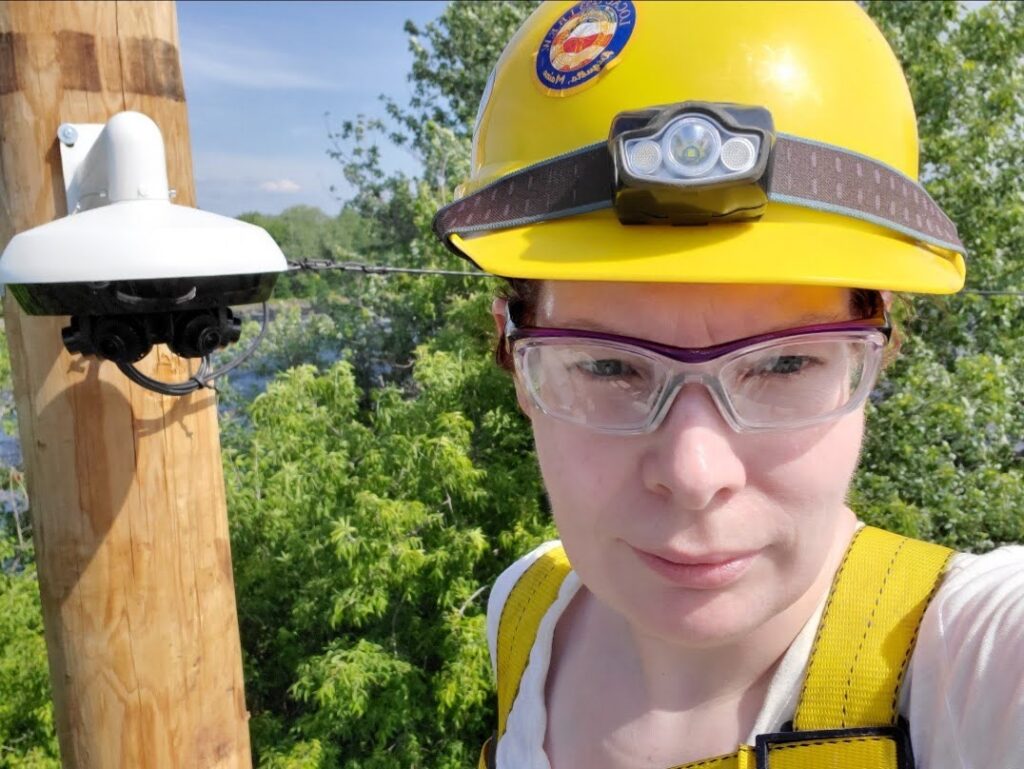Kimberly Tobias
Kimberly Tobias is an electrical apprentice in Manchester, Maine. She is a member of International Brotherhood of Electrical Workers (IBEW) Local 1253.
How did you get into an union apprenticeship?
I used to work at a healthcare software call center. I had interviewed for a promotion within the call center that would have been life changing—better hours, double the pay—and management strongly implied that I got the job. Then, they gave it to someone else. A couple of my coworkers had left the job to go into union apprenticeships and after being passed over, I thought, “If those guys can do it, I can too” and applied for the apprenticeship program. I started an apprenticeship in the summer of 2019 and graduated in May of 2022 and now, I’m just 2,000 hours away from becoming a journeyman.
Why is being a union member important to you?
It’s important to be a union member because the company isn’t going to have your back, they’re going to protect themselves. As a union, we’re in this together. I’ve seen what people working together looks like—when you all stand together and support each other. We’ll pass around a hardhat at the worksite to raise extra funds for someone, we’ll deliver a hot meal, we’ll give someone a break when we notice someone needs help. My dad worked in a papermill for 30 years as a member of the United Steelworkers and eventually became a staff representative. When he died, at least half of the people who came to the funeral were his union siblings. To this day, some of them still reach out to my mom and I to check in. It’s like having an extended family—the union bond goes deep.
Why do you think it’s important for unions to organize around the climate crisis?
In construction and the trades in general, you meet people you’re surprised to see in a union. In the beginning, they don’t care about the climate crisis or think that it’s BS or that it’s not their thing, but because of my relationship with them as a fellow union member, I’m in a position to show them a different view. I’m there to learn and earn a good paycheck, but at the end of the day, I might teach someone something too and change their mind. People are worried and want to make a change and it’s just a matter of getting people to see that our jobs make a difference when we build a solar field or an offshore wind farm.
Have you and your coworkers been impacted by the climate crisis?
We didn’t get a lot of snow this past winter, but our snow was so wet because of how warm it was. It would melt quickly and then freeze overnight—we’d come to work and everything would be covered in a sheet of ice. Plus, a lot of the sites we work are on hills and with that kind of ice and carrying 60 lb solar panels, the work just can’t happen. Since the worksites had to shut down so often during the winter, I wasn’t able to maintain at least 140 hours a month and lost my health insurance. This was the first year since I’ve joined the union that I wasn’t able to maintain my hours, all because the weather made the job sites too dangerous to work.
You’re one of the member leaders of the Maine Labor Climate Council’s campaign for pro-worker climate action in Maine. Why is it important for union workers to speak up about the climate crisis?
We’re a dying breed. Most members of my local—most electricians in the state of Maine—are over the age of 55 and they’re going to be retiring in the next ten years. However, we can combat the climate crisis and the worker crisis. There’s this traditional idea of a union worker as an older man wearing a hardhat with a cigarette hanging out his mouth. They don’t think of people like me—a mom of three kids. But this work is for everybody. People will be attracted to the trades because they’re worried about the climate crisis and want to do something about it. We, union members, need to speak out about climate issues so we can show the work we do can leave a world our kids deserve.
The Maine Labor Climate Council is supporting two offshore wind bills that will create good union jobs and stronger local communities in Maine. Why is it important for lawmakers to support strong labor standards as they build more clean energy, like offshore wind?
The biggest reason is safety—safety of the workers and safety of the community where these [wind farms] will be built. These will be big construction projects and we want strong safety standards and safety standards are what unions are known for.
This interview has been condensed and edited for content and clarity.

